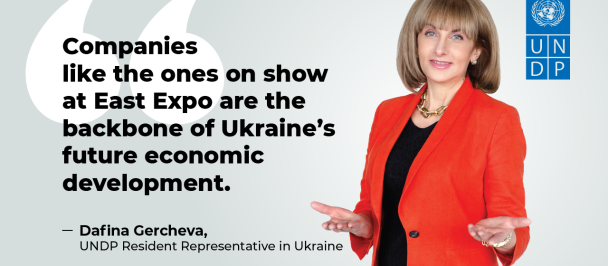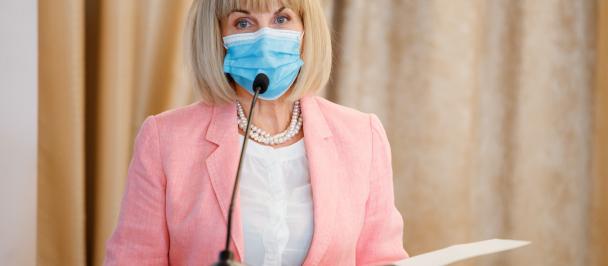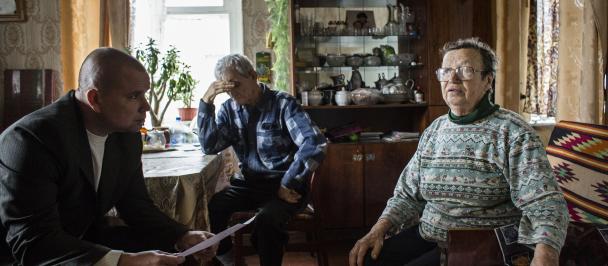Dear colleagues, distinguished participants,
On behalf of the United Nations Development Programme in Ukraine, I am pleased and honoured to address you here today at the Richelieu Forum: “Civil Service 3.0. Foresight and Transformation”.
Effective, efficient, transparent, accountable, people-cantered and corruption-free public administration is a key prerequisite for fulfilling Ukraine’s aspirations for economic integration and political association with the European Union. Public administration that is fully compliant with the European standards and democratic values and principles, such as rule of law, access to justice and human rights protection and promotion, guarantees evidence-based, inclusive, and participatory decision making, planning, and quality service delivery at all levels.
Back in 2015, all 193 UN member states adopted the 2030 Agenda for Sustainable Development and its 17 Global Goals. This blueprint is the boldest manifesto that humanity has ever had – one which gives us a sense of direction, and an action plan for the protection of people and planet, and for the promotion of prosperity, peace and partnerships.
Yet despite some notable achievements, the progress made on the various sustainability targets within the 2030 Agenda, and specifically Goal 16 – the ultimate target of which is building peaceful, just and inclusive societies – has been limited. This is partly due to the perhaps intangible aspects of peace, the rule of law, and inclusive institutions. At the same time, policymakers and activists alike recognize that these intangible aspects are essential for enacting the whole agenda.
UNDP has been supporting the government of Ukraine in integrating and mainstreaming the Global Goals into the national legal framework, developing strategies and plans, allocating the commensurate resources, and enhancing public institutions’ capacity for evidence-based decision making, as well as monitoring and evaluating the progress made in the advancement of sustainable human development.
The civil service, as the backbone of the public administration system, is responsible, along with other stakeholders, for the implementation of an ambitious reform agenda, and for achieving national priorities and fulfilling the people’s aspirations. It is the key driver behind the country’s prosperity and resilience, hence targeted investments in enhancing its professionalism are much needed. An important direction for creating an efficient and effective governance system is to form a high calibre, transparent and politically neutral civil service, which enjoys a conducive working environment, access to learning and knowledge acquisition, acknowledgement of achievements and stellar performance, professional recognition, and promotion. The deployment of innovative approaches to this end could be instrumental.
Human rights and universal freedoms should be the bedrock of the civil service. According to a UNDP-supported national survey “What Ukrainians know and think about human rights”, public officials in Ukraine do indeed respect human rights. In 2020, civil servants’ top priorities and fundamental rights continue to be freedom, justice, dignity, security, and equality. However, only about 50 percent of public officials know that (according to the Universal Declaration of Human Rights) “all human beings are born free and equal in dignity and rights,” and that everyone is entitled to these rights “without distinction of any kind, such as race, colour, sex, language, religion, political or other opinion, national or social origin, property, birth or other status.”
We are proud to see that the National Agency for the Civil Service in Ukraine demonstrates commitment to promoting human rights principles across public institutions. This year, the National Agency, in partnership with UNDP and civil society, launched a comprehensive training programme “Human Rights for Civil Servants”. It introduces non-discriminatory practices and covers inclusive policies that ensure no one is left behind.
We have numerous other joint achievements within our long-standing cooperation with the National Agency of Ukraine on the Civil Service, such as the educational series for civil servants “Access to Public Information” and “What is Public Policy and How to Shape It”, Digital Education” and many others.
We have also worked in partnership with the European Union to support the modernization and digitalization of the Ukrainian Parliament and its Secretariat through the realization of a strategic development plan and comprehensive human resources development. Together, we have launched 18 online thematic training courses to promote key “soft” and “hard” skills of civil servants of the Verkhovna Rada Secretariat, organized over 80 training activities for the key parliamentary stakeholders, and developed the new online training platform of the Verkhovna Rada for the organization of professional training, and many others.
This year’s Forum is dedicated to Foresight and Transformation, and I’d like to commend the organizers for focusing on these issues. At times of crisis such as COVID-19, which is a global, deadly and multifaceted emergency, and in an interdependent and complex world, only a few public policy challenges can be confined to one particular policy area anymore. Many governments have realized that a single-issue focus is often insufficient in dealing with emerging threats and opportunities. They have therefore started to experiment with strategic foresight that deliberately cuts across the traditional boundaries of policy areas and government departments.
Civil servants have to be prepared to embrace strategic foresight and support transformation, so that informed policy trade-offs and decisions about the future are made.
This year’s Richelieu Forum provides an excellent opportunity for topical, mutually beneficial and constructive dialogue around a #NextGenreration civil service, which is citizen-oriented, motivated and highly professional.
Let me conclude with a quote: “Coming together is a beginning, staying together is progress, and working together is a success”.
We at UNDP are interested in learning about the outcomes of the Forum, which will help us co-design new programming for further enhancing the capacities of the civic service, making it fit for purpose in the 21st century.
I thank you, and wish you very productive and insightful deliberations.

 Locations
Locations




